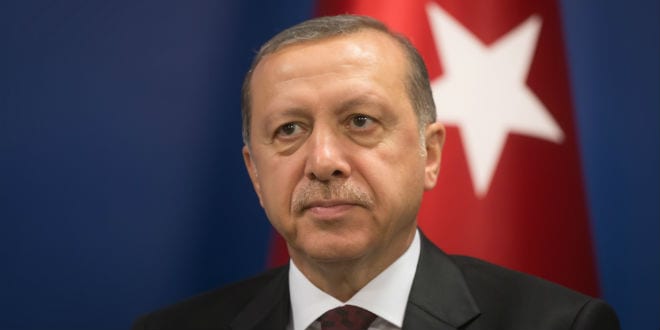A premiere Turkish newspaper recently published an article in which prominent academics called for the formation of a multinational army patterned after NATO that, according to its proponents, would be “one of the West’s greatest fears.” This may seem like conjecture however Turkish President Erdogan has adopted this as one of his goals while expanding Turkey’s military involvement in the region.
The shortcode is missing a valid Donation Form ID attribute.
Report Calls for Turan Army
The Yeni Çağ daily, a Turkish nationalist newspaper, published an article on October 28 titled “The Turan Army.” In the article, the author, Ahmet GÜRSOY, called for the formation of a “pan-Turkism” organization which would include a “Turan Army.” Under the headline “The Turkic States Must Unite: The Turan Army Is The Hope,” the article described a new militaristic vision of pan-Turkish nationalism which due to geographic realities could never materialize as a contiguous national entity.

“The eternal dream of Turkish nationalists, the great homeland; The Turan dream may not come true in geography,” Gursoy wrote. “Therefore, we may not be able to unite all Turks in the geography under a single flag as in the times of the empire. However, by transforming into legal entities in every social field, we can unite all Turks under a single flag, just as international companies are represented with the same flag in every corner of the earth. The most striking and possible form of this is the Turan Army.”
In addition to the disparate geographic realities, the unification of several countries leads to the question of who will lead the army. Gursoy had an answer ready in which he suggested that the pan-Turan army be patterned after the North Atlantic Treaty Organization (NATO). This comparison is ironic as Turkey is, in fact, a member state of NATO.
“In addition to an institutional structure that will form the roof of the partnership, there will be a legal arrangement of what will be like a kind of Turkish NATO,” he wrote.
Erdogan Working to Form Turan Army
A pan-Turan army may be closer than most people think as Turkish President Recep Tayyip Erdoğan is working hard to bring this about. Much of his policy and rhetoric reflects pan-Turanist influence. On August 20, 2020, Turkish daily Yeni Akit reported that Turkish President Recep Tayyip Erdoğan planned to announce on October 29 the formation of a Turan Army. This announcement never took place however many believe it still might. It is interesting to note that the article in Yeni Çağ came one day before the scheduled announcement by Erdogan concerning the formation of the Turan army.
Conflict Between Azerbaijan and Armenia Catalyst for Pan-Turkism
In the article, Prof. Dr. Kürşad Zorlu described how the victory of Turkey-supported Azerbaijan over Armenia in their conflict over the Nagorno-Karabagh region has brought this pan-Turan NATO closer to reality:
“The success in Karabagh has brought once again to the agenda one of the West’s greatest fears: the Turan Army. Azerbaijan, which has become stronger with the military training, joint drills, and support with armed drones that Turkey has provided, has broken Armenia’s back. This picture of success that has appeared has once again brought to life the hopes concerning a Turan Army, which would be the joint military power of the Turkic states. The Turan Army, which will be a unique option for disrupting the plots in the region, will become a leading actor on every issue.”
“The idea of a ‘Turan Army,’ which has been discussed for a long time, has once again come to the agenda following Azerbaijan’s successes against Armenia in Nagorno-Karabakh, which it achieved with the support of the military training, joint drills, and armed drone support that Turkey gave. Most recently, the agreement on military training and cooperation [signed] on the visit of [Turkish] Defense Minister Hulusi Akar to Kazakhstan, has been as a step toward establishing a joint army of Turkic states. Experts who have answered our newspaper’s question of ‘Is a Turan Army possible?’ called attention to the point that this army, which is expected to be formed under Turkey’s leadership, would be able to have a voice on every issue, regionally and globally.”
Pan-Turkism/Pan-Turansim: A Short History
As a theoretical political movement, pan-Turkism emerged during the 1880s among Turkic intellectuals of the Russian region of Shirvan (now central Azerbaijan) and the Ottoman Empire (modern-day Turkey), with its aim being the cultural and political unification of all Turkic peoples. Some adherents live in the Caucasus, and Central Asia. This movement was at odds with the Ottoman Empire and, in some ways, with Islam. After the fall of the Ottoman Empire in the early 20th century, some tried unsuccessfully to replace the empire with a pan-Turkish commonwealth. Pan-Turkist movements gained some momentum in the 1940s, due to the support of Nazi Germany who in the course of the war, sought to leverage Pan-Turkism to undermine Russian influence and in an effort to reach resources of Central Asia.
The Turkish nationalist movement has been recently gaining in popularity due to the fall of the Soviet Union and the rise of other multinational movements, like the European Union. Critics perceive Pan-Turkism as a new form of Turkish imperial ambition.
Toward this end, the Turkic Council was established in 2009 as an intergovernmental organization with the overarching aim of promoting comprehensive cooperation among Turkic Speaking States. Three of its four founding member states, Azerbaijan, Kazakhstan, Kyrgyzstan, were part of the former Soviet Union. Turkey, under the prime ministership of Erdogan, was the fourth founding state with Uzbekistan joining in 2019 and Hungary being granted observer status in September 2018.
The shortcode is missing a valid Donation Form ID attribute.




